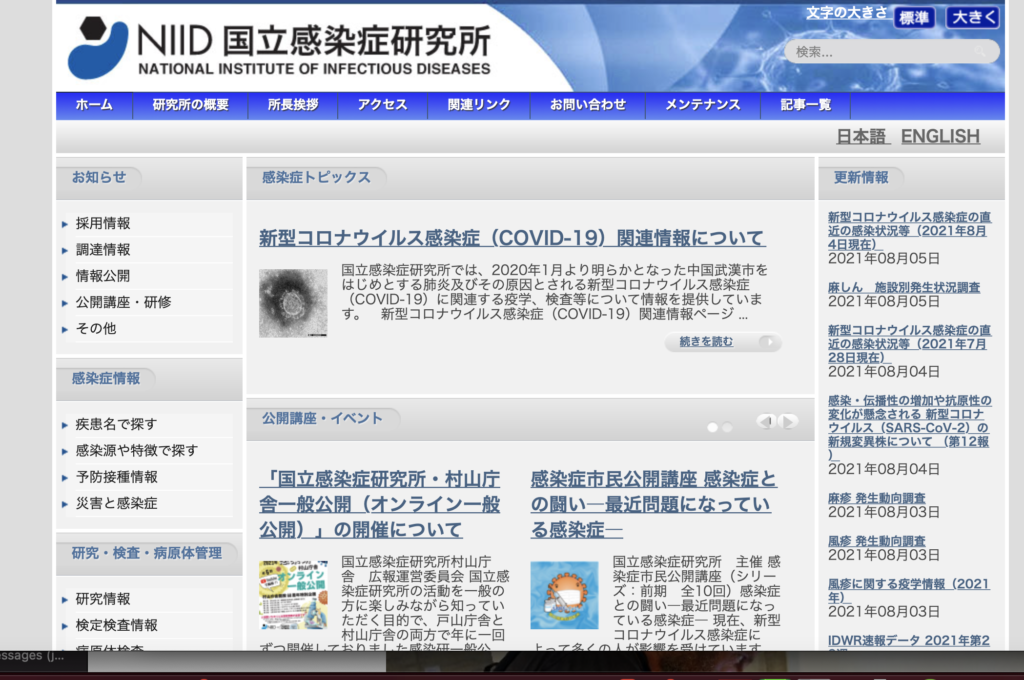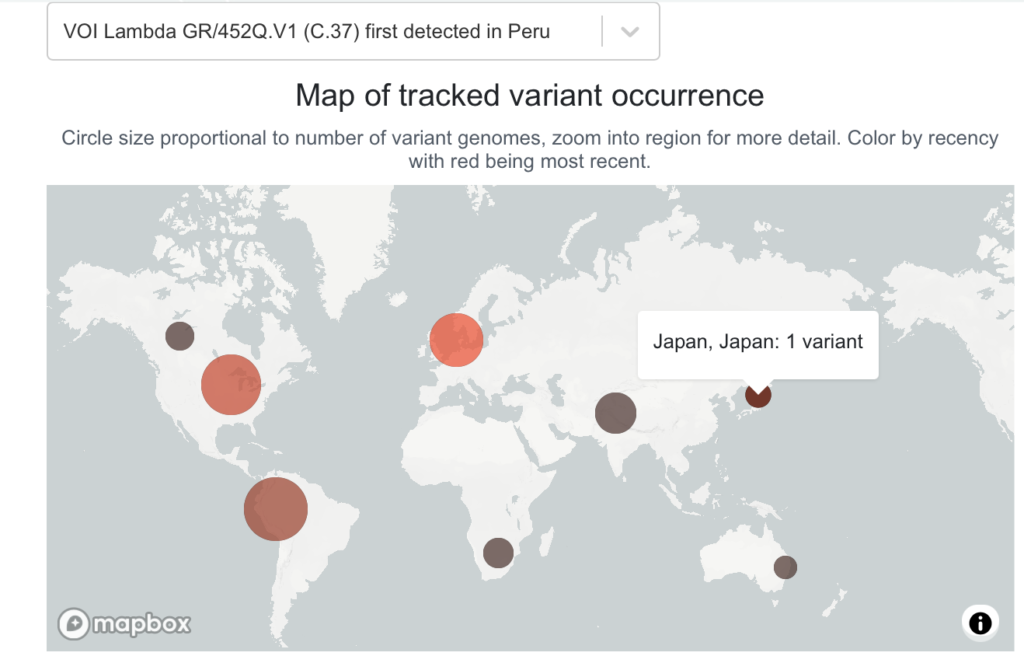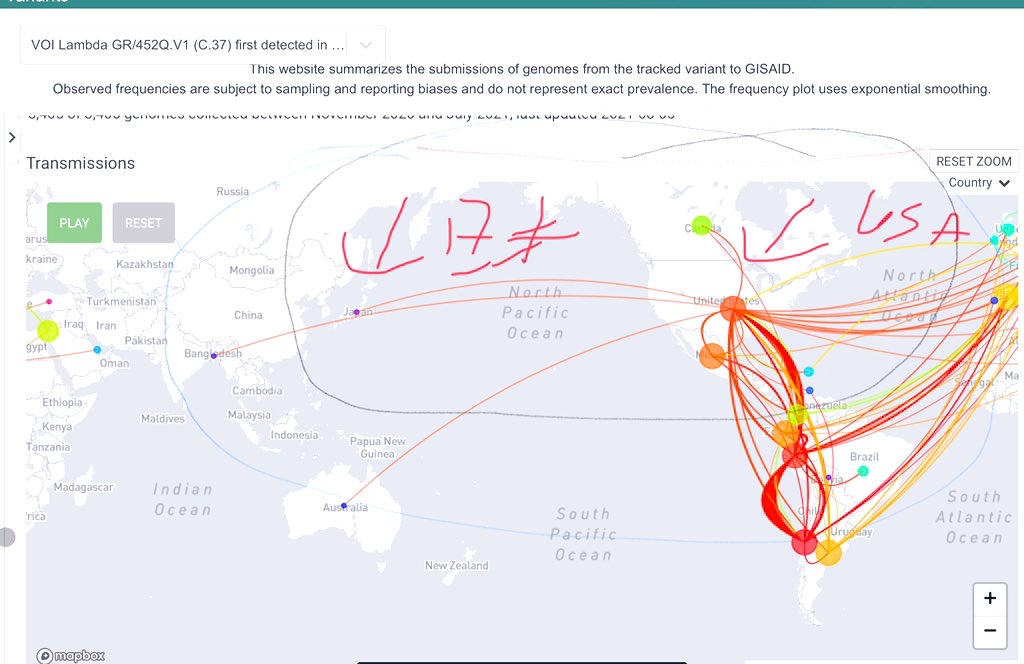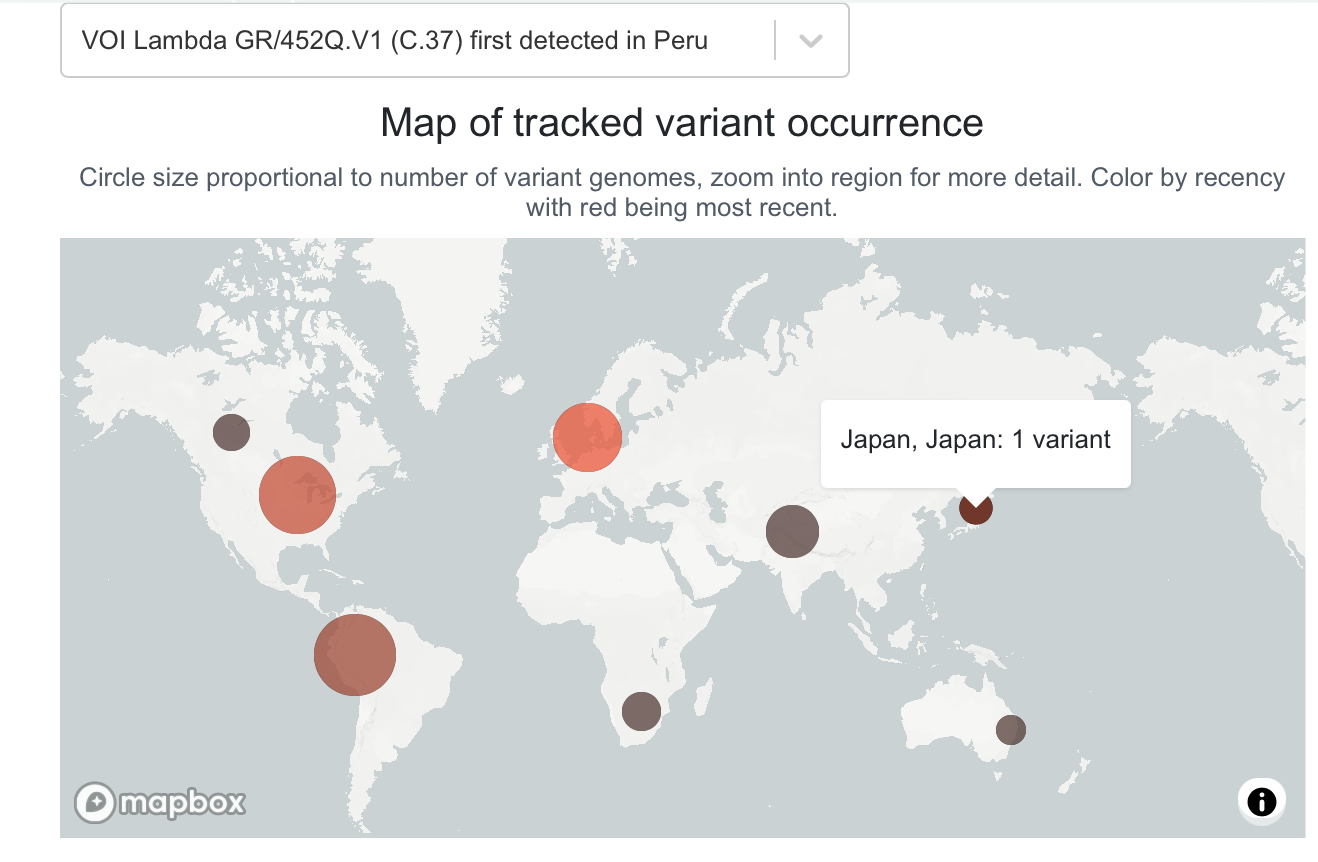The National Institute of Infectious Diseases, which filed the report, has not made it public in Japan.
By Jake Adelstein and Chihiro Kai
(Originally published at 12:08 am August 6. updated August 6, 8:35 a.m.)
For a multi-language database of clinics offering a wait-list for vaccine appointments, click here
The National Institute of Infectious Diseases (Tokyo) reported the first finding of the highly infectious Lambda variant of COVID19 here to an international database three days before the Olympics Opening Ceremony. The Institute has not publicly disclosed the details in Japan yet. One scientist who worked on the report told Japan Subculture Research Center that it was detected at an airport checkpoint and had not made it “into the wild”. He believes it originated in Peru but public data suggests it came from the US into Japan. Please note, on August 5th, Tokyo alone recorded 5,000 new cases of COVID19, the highest number since the pandemic began in Japan. Many infected are being told to self-medicate as hospitals fill up with serious cases. The entry of the Lambda variant into Tokyo is not a welcome development.

On July 20th, three days before the Tokyo Olympics began, Japan’s National Institute of Infectious Diseases reported, for the first time, that the highly infectious Lambda variant (ラムダ株) had been found in country. The report was submitted to an international COVID19 and other infectious diseases database known as GISAID. The Japanese government has not formally announced that the variant, first found in Peru, had also been found here now, as well. The variant has now been found in 26 countries. Japan could be the 27th country to host the virus.
Last month, a team of researchers at Tokyo University published an academic paper which noted that the Lambda variant was highly infectious and resistant to vaccines. In Peru, where the variant was first discovered, 80% of the infections are now traced to the Lambda variant. The research team at Tokyo University believes the variant “has potential to be a threat to the human race”. (ラムダ株が人類社会に潜在的な脅威になり得る)

The National Institute first reported finding the Lambda variant to the GISAID database on July 20. GISAID is non-profit organization that maintains a database for infectious diseases including COVID-19, founded in 2008. GISAID originally stands for Global Initiative on Sharing Avian Influenza Data. The database shared the first complete genome sequences of COVID19 in early January 2020 and there have been nearly 2.5 million submissions logged with the database since. Institutes submitting data to the group must have their credentials confirmed and agree to a database access agreement.
The variant was confirmed by the SARS-CoV-2 testing team at the National Institute of Infectious Diseases (Tokyo) and the data submitted by the Pathogen Genomics Center at the same institute. Nozumu Hanaoka (花岡希) a senior research scientist at the Infectious Diseases Center for Infectious Disease Risk Management and several other researchers signed off on the submission.
Unanswered Questions
The National Institute of Infectious Diseases has not responded to requests for further information about the discovery of the variant. For example, when was the variant found in Japan? Was it found at the airport and never made it to the wild? Was it brought to Japan by a participant in the Olympics? Where was the carrier of the virus located? Calls made to the Ministry of Health, Labor and Welfare which oversees the institute were not returned. We will continue to pursue the story and get clarification.
Any information pertaining to the Lambda variant in Japan would be welcome. Please post in the comments, which are reviewed before being made public. If you wish to submit information without disclosing your name, let us know, we will contact you privately and remove the comment if requested.
What You Should Know About the Lambda Variant
Lambda’s origin and WHO classifications for COVID-19 variants.
The Lambda variant of COVID-19 was first discovered in Peru in August 2020. As of July 14, 2021, it made up roughly 90% of COVID-19 infections in the nation and is likely responsible for the spike in coronavirus cases in Peru’s second wave of infections this spring. The World Health Organization designated the Lambda variant as a “Variant of Interest” or VOI on June 14, 2021, the lower of two classifications used to survey the public health risks of existing COVID-19 strains.
A Variant of Interest is defined as a COVID-19 variant with genetic changes that are predicted to affect the transmissibility, disease severity, and the ability of the virus to escape diagnosis and medical treatments. Furthermore, VOIs are identified to cause significant community transmission in multiple countries and suggest an emerging risk to global public health.
The good news is variants under the VOI classification carry a “keep a close eye on it” designation where WHO and member states monitor the spread as a precaution. Although the emergence of a VOI in a new country, like Lambda’s introduction to Japan in July, should be investigated, medical and government officials are more concerned about Variants of Concern.
A VOC is a variant that meets the definition of a Variant of Interest and is shown to be more contagious, induce heavier symptoms, and less responsive to available public health and social measures. The Delta variant, currently the world’s predominant strain as contagious as chickenpox, is categorized as a VOC.
The Lambda variant in Japan. What we know so far.
According to the Global Initiative on Sharing All Influenza Data, GISAID, a primary international source for open-access influenza virus data, the Lambda case detected in Japan was transmitted from the United States.

NOTE: Pardon the bad graphics. This is a low budget operation.
It is currently unclear as to how, why, or where this transmission took place. However, there have been no other Lambda cases declared in the country. Whether this is due to a properly followed quarantine protocol or a lack of Japan’s ability to detect and report additional infections is unknown. Click here to access the complete interactive Lambda database.
On July 28, Japanese scientists posted a report on the Lambda variant eight days after its domestic detection. The document is yet to be peer-reviewed.
In the document, the authors state that the Lambda variant is highly infectious, less susceptible to current vaccinations, and shows resistance to antiviral immunity elicited by vaccination. The report continues that because the “Lambda variant is relatively resistant to the vaccine-induced antisera” (blood serum containing antibodies produced in response to vaccination), “it might be possible that this variant is feasible to cause breakthrough infection” in already vaccinated populations. The scientists worry the variant’s categorization as a VOI instead of a VOC downplay the virus’s potential threat to public health.
What you can do to protect yourself and your community from COVID-19 variants.
Although the Japanese scientists’ pre-print report suggests that Lambda may possess a greater ability to escape vaccine-induced immunity, currently available vaccines are still the best way to significantly decrease your chances of catching and transmitting the virus. Vaccines provide even better protection against severe illness and death from COVID-19.
Dr. Anthony Fauci, the director of the U.S. National Institute of Allergy and Infectious Diseases, said the current surge in COVID-19 cases caused by insufficient vaccination rates gives the virus “ample” time to mutate into a more dangerous new variant in the fall and winter.
“[Q]uite frankly, we’re very lucky that the vaccines that we have now do very well against the variants — particularly against severe illness,” Fauci said to McClatchy Washington Bureau on August 4.
“If another one comes along that has an equally high capability of transmitting but also is much more severe, then we could really be in trouble,” he said. “People who are not getting vaccinated mistakenly think it’s only about them. But it isn’t. It’s about everybody else, also.”
As of Wednesday this week, only 32.39% of the Japanese population has been fully vaccinated against COVID-19. The most effective way to prevent further illness and death from all variants of the coronavirus is to promptly get as many residents of Japan fully immunized. For a multi-language database of clinics offering a wait-list for vaccine appointments, click here.

[…] 1: ロドシクルス(茸) [ニダ] 2021/08/06(金) 06:40:11.75 ID:kd7JmrLq0 BE:422186189-PLT(12015)sssp://img.5ch.net/ico/folder1_03.gifJapan Reported The First Finding Of The Highly Infectious LAMBDA Variant Here, Three Days Before The Olympics Beganhttp://www.japansubculture.com/japan-reported-the-first-finding-of-the-highly-infectious-lambda-vari… […]
[…] 1: 健康生活まとめ速報 2021/08/06(金) 06:40:11.75 ID:kd7JmrLq0 BE:422186189-PLT(12015) sssp://img.5ch.net/ico/folder1_03.gif Japan Reported The First Finding Of The Highly Infectious LAMBDA Variant Here, Three Days Before The Olympics Began http://www.japansubculture.com/japan-reported-the-first-finding-of-the-highly-infectious-lambda-vari… […]
[…] 1: 名無しは567 2021/08/06(金) 06:40:11.75 ID:kd7JmrLq0 BE:422186189-PLT(12015)Japan Reported The First Finding Of The Highly Infectious LAMBDA Variant Here, Three Days Before The Olympics BeganAugust 6, 8:35 a.m Japan Subculture Research Centerhttp://www.japansubculture.com/japan-reported-the-first-finding-of-the-highly-infectious-lambda-vari… […]
[…] Daily Beast reporters working on this story first published an article on the discovery of the Lambda variant in Japan, on Aug. 6, at 12:06 a.m. Japan time. […]
[…] Every day Beast reporters engaged on this story first published an article on the invention of the Lambda variant in Japan, on Aug. 6, at 12:06 a.m. Japan time. […]
[…] Daily Beast reporters working on this story first published an article on the discovery of the Lambda variant in Japan, on Aug. 6, at 12:06 a.m. Japan time. […]
[…] Daily Beast journalists are working on this story first published Article on the discovery of the Lambda variant in Japan, on August 6, 12:06 AM JST. Ministry of […]
[…] Daily Beast reporters working on this story first published an article on the discovery of the Lambda variant in Japan, on Aug. 6, at 12:06 a.m. Japan time. […]
[…] Daily Beast reporters working on this story first published an article on the discovery of the Lambda variant in Japan, on Aug. 6, at 12:06 a.m. Japan time. […]
[…] Every day Beast reporters engaged on this story first revealed an article on the invention of the Lambda variant in Japan, on Aug. 6, at 12:06 a.m. Japan time. […]
[…] Daily Beast reporters working on this story first published an article on the discovery of the Lambda variant in Japan, on Aug. 6, at 12:06 a.m. Japan time. […]
[…] Daily Beast reporters working on this story first published an article on the discovery of the Lambda variant in Japan, on Aug. 6, at 12:06 a.m. Japan time. […]
[…] Daily Beast reporters are working on this story first print an article about the discovery of the Lambda variant in Japan, on August 6 at 12:06 PM Japanese […]
[…] Japan Reported The First Finding Of The Highly Infectious LAMBDA Variant Here, Three Days Before The… August 6, 2021 […]
Thanks For Sharing with us.
Really Good information
Thanks For Sharing with us.